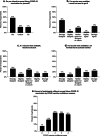Willingness to accept COVID-19 vaccination among people living with HIV in a high HIV prevalence community
- PMID: 35733209
- PMCID: PMC9214683
- DOI: 10.1186/s12889-022-13623-w
Willingness to accept COVID-19 vaccination among people living with HIV in a high HIV prevalence community
Abstract
Background: People living with HIV (PLWH) may have a poorer prognosis with COVID-19 infection and are an important population for COVID-19 vaccination. We assessed the willingness and reasons for COVID-19 vaccine acceptance or hesitancy among PLWH in South Africa.
Methods: We conducted a cross-sectional study consisting of telephone interviews with a randomly selected subset of participants enrolled in a prospective observational cohort study evaluating a decentralized antiretroviral therapy (ART) delivery program in South Africa. Questions assessed willingness to accept a future COVID-19 vaccine, concerns regarding COVID-19 vaccination, and overall vaccine confidence. Interviews were conducted between September 2020 and January 2021. We evaluated participant demographics, sources of COVID-19 information, stigma and medical mistrust, uptake of non-pharmaceutical interventions, and socioeconomic impacts of the COVID-19 pandemic as potential covariates of willingness to accept vaccination.
Results: We completed interviews with 213 participants; 153 (72%) were female, median age 35y, and 100 (47%) had completed secondary school. Among the participants, 121 (57%) were willing to accept future vaccination, 46 (22%) were unsure, and 45 (21%) stated they did not intend to be vaccinated. Fear of side effects, reported by 42 (20%), was the most common concern about COVID-19 vaccination. Older age was associated with willingness to accept vaccination (aOR 1.75 for every 10-year increase in age, 95% CI 1.10-2.78, p = 0.02), while higher medical mistrust related to COVID-19 (aOR 0.21, 95% CI 0.093-0.45, p < 0.001) and use of social media for COVID-19 information (aOR 0.30, 95% CI 0.11-0.84, p = 0.02) were associated with lower willingness to accept vaccination.
Conclusions: In this cohort of PLWH in South Africa, over half were willing to accept COVID-19 vaccination, although a substantial proportion remained unsure or were not willing to be vaccinated. Public health messaging should emphasize the safety and efficacy of COVID-19 vaccination and address misinformation and medical mistrust among PLWH. Ongoing efforts to ensure access to COVID-19 vaccines for vulnerable populations are crucial.
Keywords: COVID-19; HIV; South Africa; Vaccination; vaccine hesitancy.
© 2022. The Author(s).
Conflict of interest statement
The authors declare no conflicts of interest.
Figures

Update of
-
Willingness to accept COVID-19 vaccination among people living with HIV in a high HIV prevalence community.Res Sq [Preprint]. 2022 Apr 12:rs.3.rs-824083. doi: 10.21203/rs.3.rs-824083/v1. Res Sq. 2022. Update in: BMC Public Health. 2022 Jun 22;22(1):1239. doi: 10.1186/s12889-022-13623-w. PMID: 35441173 Free PMC article. Updated. Preprint.
Similar articles
-
A systematic review and meta-analysis of the global prevalence and determinants of COVID-19 vaccine acceptance and uptake in people living with HIV.Nat Hum Behav. 2024 Jan;8(1):100-114. doi: 10.1038/s41562-023-01733-3. Epub 2023 Oct 30. Nat Hum Behav. 2024. PMID: 37904021 Free PMC article.
-
Willingness to accept COVID-19 vaccination among people living with HIV in a high HIV prevalence community.Res Sq [Preprint]. 2022 Apr 12:rs.3.rs-824083. doi: 10.21203/rs.3.rs-824083/v1. Res Sq. 2022. Update in: BMC Public Health. 2022 Jun 22;22(1):1239. doi: 10.1186/s12889-022-13623-w. PMID: 35441173 Free PMC article. Updated. Preprint.
-
COVID-19 vaccine hesitancy among people living with HIV in a low-resource setting: A multi-center study of prevalence, correlates and reasons.Vaccine. 2023 Apr 6;41(15):2476-2484. doi: 10.1016/j.vaccine.2023.02.056. Epub 2023 Feb 23. Vaccine. 2023. PMID: 36932032 Free PMC article.
-
COVID-19 vaccine acceptability, and uptake among people living with HIV in Uganda.PLoS One. 2022 Dec 2;17(12):e0278692. doi: 10.1371/journal.pone.0278692. eCollection 2022. PLoS One. 2022. PMID: 36459514 Free PMC article.
-
Addressing vaccine hesitancy and resistance for COVID-19 vaccines.Int J Nurs Stud. 2022 Jul;131:104241. doi: 10.1016/j.ijnurstu.2022.104241. Epub 2022 Apr 1. Int J Nurs Stud. 2022. PMID: 35489108 Free PMC article. Review.
Cited by
-
Understanding COVID-19 Vaccine Uptake and Hesitancy among People with HIV in Freetown, Sierra Leone: A Cross-Sectional Study.Vaccines (Basel). 2023 Nov 2;11(11):1685. doi: 10.3390/vaccines11111685. Vaccines (Basel). 2023. PMID: 38006017 Free PMC article.
-
COVID-19 Vaccine Acceptance and Hesitancy among People Living with HIV: Review and Meta-Analysis.AIDS Behav. 2024 Jul;28(7):2193-2204. doi: 10.1007/s10461-024-04351-w. Epub 2024 May 7. AIDS Behav. 2024. PMID: 38713281
-
Socioeconomic impact of the COVID-19 crisis and early perceptions of COVID-19 vaccines among immigrant and nonimmigrant people living with HIV followed up in public hospitals in Seine-Saint-Denis, France.PLoS One. 2023 Oct 20;18(10):e0276038. doi: 10.1371/journal.pone.0276038. eCollection 2023. PLoS One. 2023. PMID: 37862300 Free PMC article.
-
COVID-19 Vaccinations, Infections, and Outcomes Among 784 People Living with HIV.Viruses. 2024 Nov 21;16(12):1805. doi: 10.3390/v16121805. Viruses. 2024. PMID: 39772116 Free PMC article.
-
A systematic review and meta-analysis of the global prevalence and determinants of COVID-19 vaccine acceptance and uptake in people living with HIV.Nat Hum Behav. 2024 Jan;8(1):100-114. doi: 10.1038/s41562-023-01733-3. Epub 2023 Oct 30. Nat Hum Behav. 2024. PMID: 37904021 Free PMC article.
References
-
- Bhopal S, Nielsen M. Vaccine hesitancy in low- and middle-income countries: potential implications for the COVID-19 response. Arch Dis Child. 2020. 10.1136/archdischild-2020-318988. - PubMed
Publication types
MeSH terms
Substances
Grants and funding
LinkOut - more resources
Full Text Sources
Medical

